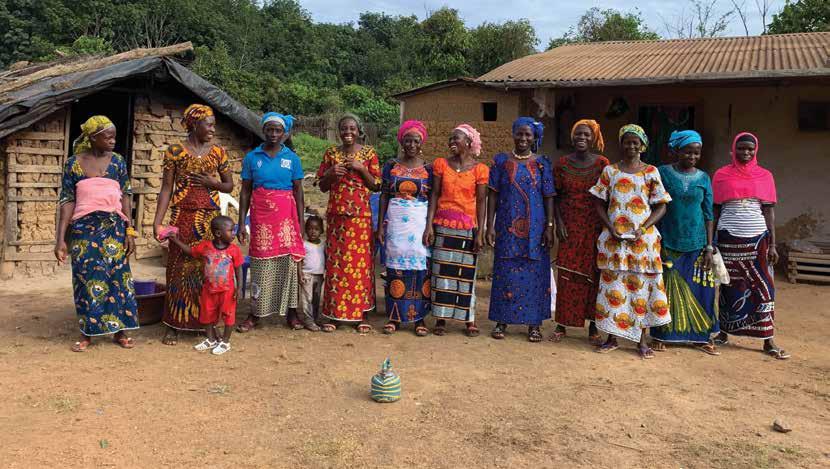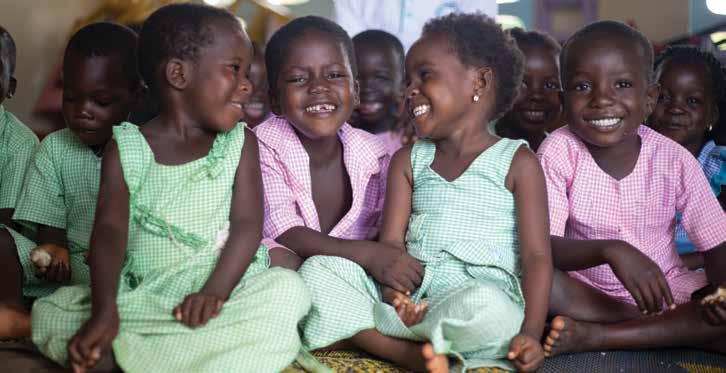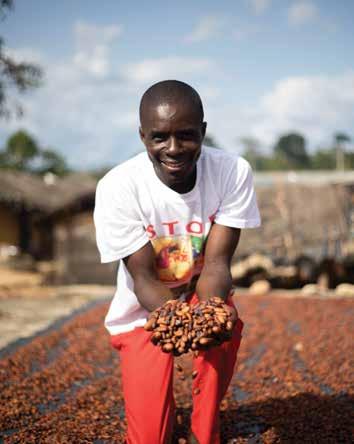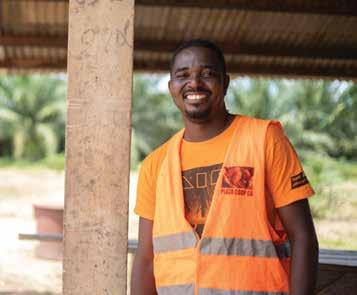
10 minute read
As Vice
Doing the right things
Michelle O’Neill, Vice President of Corporate Affairs for Mars Wrigley’s Cocoa business, explains the company’s Fairtrade journey over the last decade, details the huge investment Mars Wrigley has made in addressing structural inequalities, poverty and human rights risks in cocoa farming and explains what more needs to be done by all stakeholders.
AS Vice President of Corporate Affairs for Mars’ cocoa business, Cork-born Michelle O’Neill is at the forefront of helping to address change in the cocoa business worldwide. On the tenth anniversary since Mars joined the Fairtrade movement, she reflects on the progress made and talks us through some of the programmes the company has put in place for the betterment of cocoa farm families.
It has been 10 years since Mars Wrigley joined Fairtrade. What progress has been made over the last decade?
Over the last 10 years, Mars and Fairtrade’s partnership has improved incomes for cocoa farmers. More cocoa sold on Fairtrade terms, together with supporting programmes that enhance infrastructure, advocacy and networking, have helped to improve farmers’ economic situation. Building on 10 years of impact together, we’ve seen firsthand the positive difference that improved incomes make in cocoa communities. The Fairtrade Premium has supported farmers to invest in their organisations and infrastructure, strengthen their resilience and develop their communities. At Mars, we believe everyone working within our extended supply chains should earn sufficient income to maintain a decent standard of living. Many smallholder farms are family businesses and, like Mars as a family-owned business, we want those farming businesses to be successful for generations to come. Increasing their income is incredibly complex, and it is only one aspect of the multidimensional poverty smallholder farmers are facing. No single player can solve poverty alone but as a company, we can play a significant role, using an evidencebased and principles-led approach alongside other critical actors, including certifiers, governments, suppliers, supply chain partners and the farmers themselves, in achieving this ambition.
Is the Fairtrade movement still as important today as it was when Mars Wrigley joined?
Certification programmes have driven real improvements in organising farmer groups, providing best practice trainings, improving farm cooperative management through financial and governance training, raising awareness of child labour, and increasing farmer income through premiums.
Certifiers have helped create an enabling environment to make progress toward sustainable cocoa. We collaborate closely with certifiers to strengthen their standards and assurance process across the industry, to push for more effective monitoring, evaluation and learning. Our goal is to continue to collabourate and drive an evolution of standards. We believe this evolution will lead to the cocoa sector adopting a new approach that will bring more impact.
What are the big challenges still facing the cocoa industry?
We’ve been vocal about our belief that global supply chains are broken and that companies depending on commodities grown by smallholder farmers are at a crossroads.
The well-being of women in cocoa communities is a critical link to family food security and nutrition, education and health, and drives the longterm prospects for a future of educated cocoa farmers.

Structural inequalities, poverty and human rights risks exist in cocoa farming communities around the world, particularly in Côte d’Ivoire and Ghana, where more than 60% of the world’s cocoa is grown. Insufficient law enforcement and limited access to basic infrastructure such as roads, clean water, healthcare, mobile connectivity, banking and education, limit people’s ability to thrive. Mars is a principle-based private company; creating mutual benefits for all our stakeholders is at the heart of our purpose. Our goals are to ensure that within our extended supply chains, everyone has the opportunity to thrive, human rights are respected, and the environment is protected. The cocoa supply chain of today does not deliver on these ambitions – it is broken, and current interventions are not enough to fix it. In 2018, we launched our Cocoa for Generations Strategy (C4G) backed by a plan to invest $1 billion over 10 years (2018–2028), with the ambition of contributing to transforming the cocoa supply chain so that global sustainable development goals are met, human rights are respected, the environment is protected, and cocoa farmers, their families and their communities have the opportunity to thrive.
There has been some criticism of chocolate companies over the perceived failure to eradicate child labour from the chocolate supply chain, where it is estimated that over 1.5m children still work on cocoa plantations (NORC Report, October 2020). What has been done and what more can companies like Mars Wrigley do to fight the problem of child labour?
In February 2020, we launched our Protecting Children Action Plan (PCAP), our approach to identifying, preventing and mitigating human rights issues in our cocoa supply chain. The PCAP sets out how we seek to work with suppliers, governments, experts and others to identify, prevent and mitigate human rights issues. It prioritises child and forced labour risks in our extended cocoa supply chain by establishing robust data collection and management systems, implementing effective human rights due diligence processes in collabouration with partners, and supporting communitybased investments and development programmes designed to address the root-causes of human rights issues in the areas of women’s empowerment, education and income. We have committed to report on our progress and in early February, we released our cocoa human rights report, Respecting Human Rights in the Cocoa Supply Chain, sharing advances, learnings and insights against the PCAP’s four-lever approach. While we are making strides in our approach, more must be done to reach our ambitions. To achieve meaningful impact that enables cocoa farmers to thrive, public-private partnerships, coupled with appropriate due diligence legislation, where needed, will be essential. Together, these enablers can help improve farmer income and advance respect for human rights

Mars Wrigley has worked with cocoa farming communities to improve infrastructure, such as this cocoa nursery.
and the environment in cocoa growing communities.
How is Mars Wrigley working to improve life for workers in the cocoa supply chain?
Our PCAP approach comprises four main levers, designed to be mutually reinforcing:
• Robust Child and Forced Labour Monitoring and Remediation Systems to ensure our suppliers have robust systems to identify, prevent and seek to remediate child labour and forced labour (as defined by the ILO conventions). We will seek to ensure 100% of at-risk families in our cocoa supply chains are covered by Robust Child and Forced Labour Monitoring and Remediation Systems by 2025. Implementing robust child labour monitoring and remediation systems (CLMRS) has proven to have the potential to meaningfully reduce the risks, prevalence and severity of child labour, and it’s a model we expect all suppliers to have in place in West Africa by 2025. We are proud to share we are expanding CLMRS across our cocoa supply chain in West Africa, with nearly 70% (from 51% in 2019) of total volumes of cocoa sourced in Côte d’Ivoire and Ghana coming from farmer groups that have CLMRS in place, across 58,000 households.
• Women’s Social and Economic Empowerment: The well-being of women in cocoa communities is a critical link to family food security and nutrition, education and health, and drives the long-term prospects for a future of educated cocoa farmers. Together with Care International, we have developed a unique Village Savings and Loans Association (VSLA) model that includes a number of essential building blocks beyond the foundational savings and loans activity. To bolster our partnership with Care, we extended our support with an additional $10m investment to further expand our unique VSLA model beyond the 24,000 members we have supported through the end of 2020, targeting to reach more than 60,000 members by 2025. Women’s and girls’ empowerment is a dynamic and transformative process of change, which requires addressing gender inequalities and disempowerment across multiple dimensions, which also presents a variety of entry points for the transformation that’s needed to reshape the future of cocoa. To address these challenges, we have partnered with the Royal Tropical Institute (KIT) to conduct qualitative research to understand and explain behaviours, experiences and attitudes in relation to the (in)equality and (dis)empowerment that women face in their daily lives in cocoa growing communities in Côte d’Ivoire, Ghana and Indonesia. We have called this first stage of the work the ‘Empathy Generation’ phase. This unique study covers understanding of aspirations, challenges and rich realities of women of all ages by listening to them and helping their voice


In the decade since Mars Wrigley joined Fairtrade, more cocoa sold on Fairtrade terms, together with supporting programmes that enhance infrastructure, advocacy and networking, have helped to improve farmers’ economic situation.
to be heard. The complete results of this first phase of research are bundled in the Empathy Report, which can be accessed at Mars.com/news-and-stories.
• Increasing Access to Quality Education and Development Opportunities for Children: Education access and quality are critical components of driving better long-term futures for children in cocoa-growing communities. Since 2017, we have worked with the Transforming Education in Cocoa Communities (TRECC) programme funded by the Jacobs, Bernard van Leer and UBS Optimus Foundations, through the implementation of a number of pilots. This work has given us insights into the powerful linkages between robust monitoring systems, women’s empowerment and education interventions. In the long term, investing in education can have a positive circular effect; educated children can earn higher incomes and contribute more to the development of their own children, households and communities. We will continue to learn from our work with Jacobs Foundation and other expert education organisations to develop additional programmes and interventions where relevant, particularly in other countries. In 2020, in collaboration with a number of key industry players and stakeholders from the cocoa industry, we committed $3.3m to support the Jacobs Foundation’s creation of two new funding facilities aimed at promoting quality education and early childhood development and nutrition, in line with the Côte d’Ivoire’s government strategic objectives in the fight against child labour. to maintain a decent standard of living. Many smallholder farms are family businesses and, like Mars as a family-owned business, we want those farming businesses to be successful for generations to come. Increasing their income is incredibly complex, and it is only one aspect of the multi-dimensional poverty smallholder farmers are facing. No single player can solve poverty alone but as a company we can play a significant role, using an evidence-based and principles-led approach alongside other critical actors, including governments, suppliers, supply chain partners, the Farmer Income Lab and the farmers themselves, in achieving this ambition.

The Fairtrade Premium has supported farmers to invest in their organisations and infrastructure, strengthen their resilience and develop their communities.
From Cork to Brussels: Michelle’s story
“AS Vice President Corporate Affairs Cocoa for Mars Wrigley, I am a member of the company’s cocoa business team and also lead a team of corporate affairs professionals around the world who take care of reputation and crisis management and government and public affairs related to cocoa,” Michelle O’Neill explains. “I have been at Mars since April 2015, first sitting on the chocolate business leadership team for Europe and then moving to a global role to focus on cocoa, the company’s most important ingredient. This role has taken me to fascinating parts of the world. It’s been especially inspiring to meet with farmers in rural areas of the developing world. Smallholder farmers grow over 70% of the world’s food so their destinies and ours are intertwined - we must support these farmers to thrive and in a way that is sustainable for the planet. “For about 25 years I have been active in government relations, public affairs and communications and mainly in the sustainability space. This involves meeting lots of people from different backgrounds and political persuasions, which means I constantly learn. It helps that I studied languages in UCC – language skills are a great way to break barriers, build trust and enable collaboration. My career in Brussels started in the European Commission as an intern, where I worked on gender equality. I then moved to the American Chamber of Commerce to the EU, Hewlett-Packard, Honeywell and finally, Ingersoll Rand. I was born in Cork and went to university there. I now live in Brussels with my husband, son, daughter, two dogs and a cat. I remain hopeful that there will be a direct Cork-Brussels flight in the future.”










